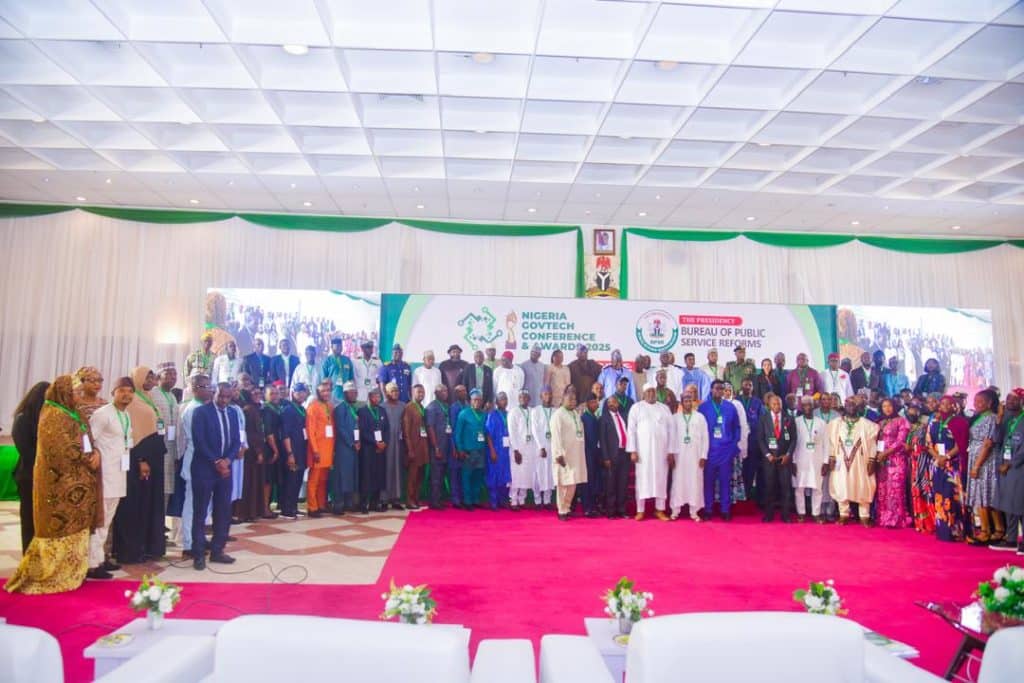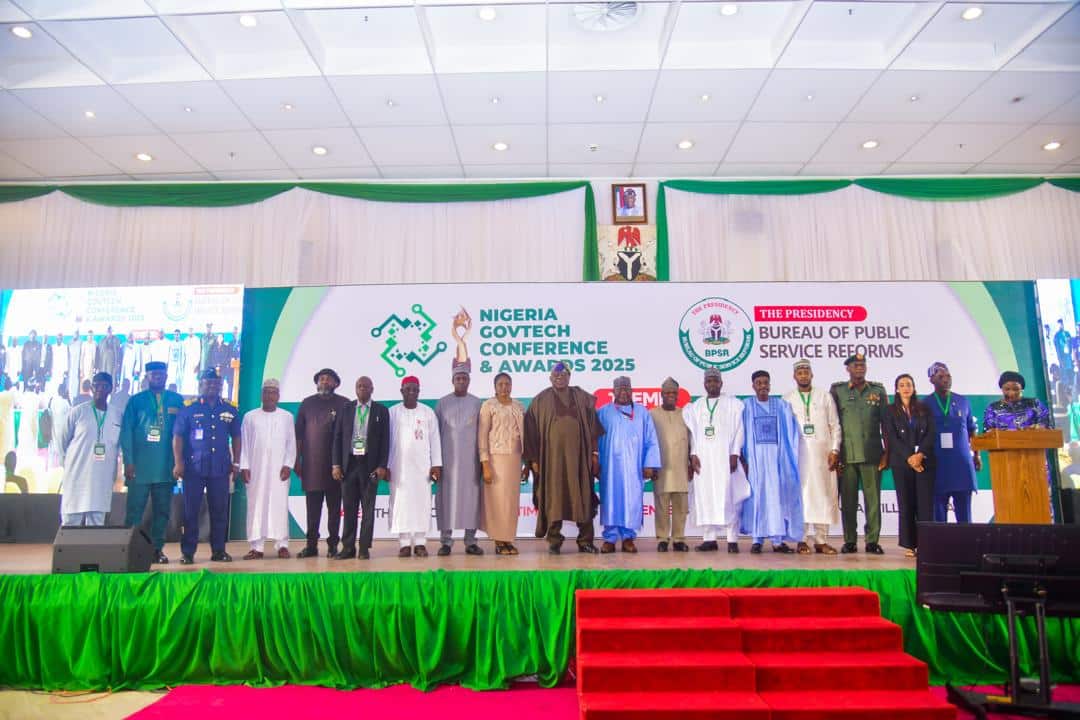The Secretary to the Government of the Federation (SGF), Chief George Akume, has commended the Bureau of Public Service Reforms (BPSR) for its pioneering role in advancing Nigeria’s digital governance and transforming public service delivery.
Akume gave the commendation while delivering the keynote address at the 2025 Nigeria GovTech Summit and Awards, held at the Presidential Banquet Hall, Aso Villa, Abuja, on October 9 and 10, 2025. The annual summit, themed “Redefining Possibilities: Harnessing Emerging Technologies for Public Service Delivery and Socio-Economic Development,” brought together policymakers, innovators, and public sector leaders to discuss ways of deepening technology-driven reforms in governance.
The SGF praised the BPSR for sustaining what he described as “a laudable platform which has become the leading forum for knowledge exchange, innovation showcase, and recognition of excellence in the application of technology for governance and public service delivery.”
He noted that the summit aligns perfectly with President Bola Ahmed Tinubu’s reform agenda, which prioritizes harnessing digital tools to strengthen government institutions, improve efficiency, and enhance transparency in service delivery.

“This Summit is particularly significant, as it speaks to the heart of our administration’s reform agenda: the urgent need to harness digital technology in transforming the machinery of government, strengthening institutions, and improving the quality of service delivered to our citizens,” Akume said.
According to him, the world has entered an era where “the competitiveness of nations, the resilience of economies, and the trust between governments and their people are largely determined by how effectively digital solutions are deployed in governance.” He therefore emphasised the Federal Government’s commitment to building “a digital-first public service that is efficient, transparent, and citizen-centric.”
Akume explained that ongoing government reforms are focused on strengthening interoperability of government platforms, enhancing digital identity management, improving cybersecurity, and promoting the adoption of e-Government tools across Ministries, Departments, and Agencies (MDAs).
Beyond technology deployment, the SGF underscored the importance of an enabling environment that supports innovation and collaboration. He said this includes “policy and legal frameworks that foster innovation, ensure data protection, and encourage private sector participation,” as well as “capacity building to equip public servants with the digital skills necessary to operate effectively in a 21st century governance ecosystem.”
He added that public–private partnerships remain critical for driving sustainable investments and ensuring digital solutions are scalable and accessible to all citizens.
“GovTech is not only about governance efficiency; it is a driver of socio-economic development,” Akume stated, noting that digitized government services reduce the cost of doing business, eliminate bureaucratic bottlenecks, and create a transparent environment that attracts investment.
The SGF further explained that digital transformation empowers micro, small, and medium enterprises (MSMEs), opens job opportunities for young Nigerians, and unlocks the innovation potential of the nation’s tech ecosystem — all of which are “critical levers for sustainable growth, poverty reduction, and wealth creation.”
He also commended the organizers for recognizing MDAs and individuals who have demonstrated excellence in digital governance through the Nigeria GovTech Awards, describing it as “motivational and necessary for building a culture of innovation and continuous improvement across the public sector.”
“Nigeria cannot afford to lag behind,” Akume stressed. “We must seize the opportunities before us to build a government that is transparent, accountable, and driven by data and innovation, one that serves as a foundation for effective service delivery and sustainable economic development.”
Declaring the summit open, the SGF congratulated the BPSR and its partners for hosting a transformative forum that aligns with the administration’s drive toward a digital economy. “I urge all participants to engage actively, collaborate meaningfully, and translate the insights from this forum into concrete action,” he said.
In his welcome address, the Director-General of BPSR, Dasuki Ibrahim Arabi, described the conference as “a landmark event dedicated to redefining public sector excellence through advanced IT automation protocols.” He expressed appreciation to the Irish Embassy, the Nigerian Content Development and Monitoring Board (NCDMB), and other critical stakeholders for their collaboration in hosting the event.
Arabi reaffirmed that the BPSR remains at the forefront of promoting reforms that align with the National Strategy for Public Service Reforms (NSPSR) and the e-Government Master Plan, which advocate the use of ICT platforms, open data, e-services, and electronic data record management systems to enhance service delivery.
He revealed that Nigeria’s digital transformation efforts have gained global recognition, noting that the country recently received an award for Advanced Inclusive and Responsible Digital Governance at the ongoing Open Government Partnership Global Summit in Spain.
The DG also disclosed that the Bureau is working with the Nigerian Communications Commission (NCC) to integrate Distributed Ledger Technologies into MDA operations to improve efficiency, protect data, and optimize resource allocation. According to him, “We must now begin deploying emerging technologies, from Artificial Intelligence (AI) and Machine Learning (ML) to Robotic Process Automation (RPA) and Blockchain.”
Highlighting the Bureau’s achievements, Arabi cited the Self-Assessment Tool and the Website Ranking Scorecard for MDAs as part of BPSR’s initiatives to drive transparency and performance monitoring across public institutions.
He said the Bureau plans to train 500,000 public servants in digital literacy and emerging technologies to sustain Nigeria’s digital transformation drive, emphasizing that “digital tools alone cannot drive transformation. We must invest in people, the true enablers of innovation.”
Arabi concluded by calling for sustained investment in technology, ethical practices, and smart regulations to modernize the public sector. “With visionary leadership, sound technology investments, and cross-tier collaboration from Federal to State levels, we can build a responsive, transparent, and inclusive government that truly serves its people in the digital age,” he said.
The two-day GovTech Summit and Awards featured presentations, panel discussions, and recognitions of MDAs and innovators championing excellence in Nigeria’s digital governance space. It reaffirmed the Federal Government’s commitment to transforming the public service into a modern, efficient, and citizen-focused institution powered by technology.
END
Aliyu Umar
Head Strategic Communications
Bureau of Public Service Reforms


